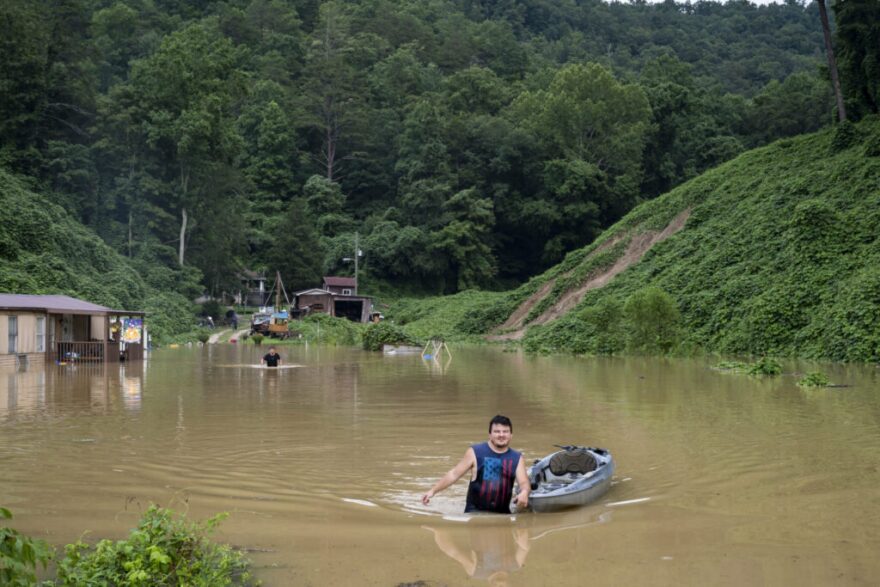Kentucky’s state government will be unable to compete for $4.6 billion from the federal government to reduce heat-trapping greenhouse gasses because it is one of only four states that did not apply for up to $3 million to create a climate action plan through a new grant program.
A spokesperson for Kentucky’s environmental agency said the Beshear administration is leaving the decision whether to apply for the climate-planning money up to the state’s largest cities.
An environmental advocate called the decision disappointing, given that Kentucky has suffered “major climate disasters” in the form of floods and tornadoes.
The Climate Pollution Reduction Grants Program, established through the Democrat-backed Inflation Reduction Act of 2022 and housed in the U.S. Environmental Protection Agency, aims to give grant funding to states, local governments, tribes and others to develop and implement plans to reduce greenhouse gas emissions in the wake of increasing climate change-driven extreme weather and disasters.
The grant program is doling out up to $250 million to states and local governments to create plans to reduce emissions, including to fund community outreach and engagement in creating the plans and paying for staff and research to target emissions. Those who apply for the planning grants will then be eligible for a much larger round of grants, up to $4.6 billion, to implement the newly-created plans.
“The promise is clean, affordable energy, safe, breathable air free of toxics for all Americans, well-paying jobs sustained by the new energy economy,” said Jennifer Macedonia, an U.S. EPA administrator speaking at a February webinar. “The Climate Pollution Reduction Grant Program, in concert with other federal funding streams, represents a once-in-a-generation opportunity to invest in our future and realize transformative, lasting change.”
The program was presumptively giving states up to $3 million in planning funds and the country’s largest metro areas, including Louisivlle, up to $1 million in funds. Yet Kentucky was one of four states — along with Florida, South Dakota, and Iowa — that declined to apply for the money by a deadline of March 31. According to federal guidance, states that do not apply for a planning grant cannot apply for any of the $4.6 billion to implement the plans.
Kentucky Energy and Environment Cabinet spokesperson John Mura in a statement earlier this month said local governments are “best situated to apply for and administer” the grant funding.
“The Beshear administration is actively applying for and receiving a number of federal grants to help boost efforts to build a better Kentucky for all our people,” Mura said.
Because the state declined the up to $3 million in planning funds, Kentucky’s three largest metro areas — Louisville, Lexington and Bowling Green — are eligible to receive the state’s share of grant funding if they apply by April 28. Officials in Louisville and Lexington have indicated they are applying, while the grants coordinator for Bowling Green said the city is “currently looking” into the program.
Kentucky Conservation Committee Executive Director Lane Boldman, whose organization represents conservation and renewable energy groups, said earlier this month she was disappointed Kentucky didn’t apply for the program because the state needs to be “using all the tools that the federal government is offering to us.”
“Particularly in a state that has dealt with two major climate disasters — whether they want to call them that or not — with excessive flooding and the tornadoes, we need to be beefing up our capacity for those situations to continue,” Boldman said.
According to federal guidance, at least three metro areas in Kentucky need to apply for the state’s declined share of the planning funding or the money could go to a metro area in another state. However, local governments that don’t don’t apply for a planning grant could still receive some of the billions of dollars in implementation grants as long as a local government’s proposal is a part of an existing climate emissions reduction plan.
Jada Griggs, the city of Lexington’s senior program manager for sustainability, said the program will allow the city to collaborate with surrounding counties on creating goals to reduce greenhouse gas emissions, some of which may have a “significant cost” that grant funding could help with.
“There is work that has to be done, and I believe the support is there,” Griggs said. “It’s important to me to not just set the targets but have a game plan so that when I’m retired, the city can still meet those, or know what to do to make the adjustments to make those come to fruition.”
Leading climate researchers with the United Nations last month issued increasingly urgent warnings to countries to slash almost two-thirds of carbon emissions by 2035 in an effort to still meet climate warming targets set by the Paris climate agreement and limit the detrimental impacts of climate change.
Inside Climate News recently reported that Kentucky is dead last among the states in energy production from solar and wind, according to data from the U.S. Energy Information Administration.
This story was originally published by the Kentucky Lantern.





